VOD: On Jan. 30, U.S. District Court Judge John Corbett O’Meara struck down Michigan’s parole statutes with regard to those serving juvenile life without parole. (See article above.)

Michigan is among the most merciless states in the nation in its sentencing practices and treatment of those who are incarcerated.,
The related article below was written by Edward Sanders, a juvenile lifer who is among the longest-serving in Michigan. Incarcerated at 17 in 1975, he is now 55. He reflects here on the need for a complete overhaul of Michigan’s parole system if both the U.S. Supreme Court ruling in Miller/Hobbs of June 25, 2012, and the Michigan federal district court ruling in Hill v. Snyder of Jan. 30, 2013, are to be substantively applied.
Sanders, who during his years behind bars has become an accomplished “jail-house lawyer,” cites a previous federal class action filed in 2005 on behalf of “parolable lifers,” titled Kenneth Foster Bey, John Alexander, Waymon Kincaid, William Sleeper, Robert Wisenauer, Eric McCullum, Gerald Lee Hessel, et. al v. John S. Rubitschun, et. al (the last being parole board members at the time.). Click on Foster Bey parolable lifers to read original lawsuit in full.

Former Michigan parole board chair Stephen Marschke testified in 1999 regarding parolable lifers, “It has been the longstanding philosophy of the Michigan Parole Board that
a life sentence means just that–life in prison . . . Good behavior is expected and is not in and of itself grounds for parole.” As Berrien County Sheriff in 1994, he was the last person to see Black teenager Eric McGinnis, 16, alive before the child’s body was found in the St. Joseph River which separates the white town of St. Joseph from nearly all-Black Benton Harbor.
In October, 2007, U.S. District Court Judge Marianne O. Battani ruled unequivocally on behalf of the plaintiffs and against what had become the parole board’s mantra, “Life means life,” as follows:
“The change in the make-up of the Michigan Parole Board, the Board’s understanding of why the change occurred and how it was to exercise its discretion, its redefining of the eligibility procedure for nonmandatory lifers, and changes to the timing and intervals of the interview and review process, when considered in total have significantly disadvantaged the class and constitute a violation of the Ex Post Facto Clause.”
Click on Foster Bey order granting plaintiffs motion 12 07 to read Judge Battani’s full ruling
.In other words, such sentences, meant by most judges to be parolable within 10-15 years, were made significantly more severe after the fact of the plaintiff’s sentencings. The Parole Board and the State, however, fought Judge Battani’s ruling and subsequent remedial orders every inch of the way. They appealed to the Sixth Circuit Court of Appeals, which affirmed her ruling in part, reversed it in part, vacated it in part, and remanded it to Judge Battani for further proceedings.
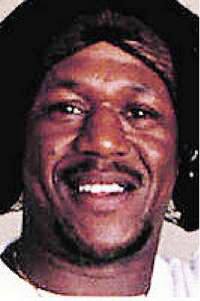
- Kenneth Foster-Bey
To date Kenneth Foster Bey, sentenced in 1975 and now 59, John Alexander, sentenced in 1981 and now 51, Waymon Kincaid, sentenced in 1976 and now 55, and Eric McCullum, sentenced in 1976 and now 64, remain incarcerated according to state records.
Michigan continues to spend $2 billion a year on corrections, “nearly one fourth of the state’s general fund and $600 million more than it invests in higher education,” according to a recent Detroit News article. Besides having the nation’s second highest-number of juvenile lifers, Michigan is one of only four states in the nation to spend more on prisons than education.
http://www.detroitnews.com/article/20130206/POLITICS02/302060362#ixzz2K7ct58L7.
http://www.mlive.com/news/index.ssf/2008/02/michigan_is_1_of_4_states_to_s.html
Write Edward Sanders at:
-
Edward Sanders #141545
-
Kinross Correctional Facility
-
16770 S. Watertower Drive Kincheloe, MI 49788
REMEMBER ‘FOSTER-BEY’ IN RULINGS ON ‘HILL’
By Edward Sanders
February 2, 2013
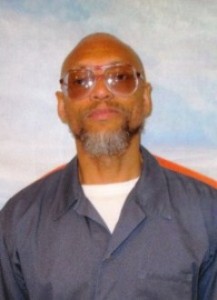
Edward Sanders, juvenile lifer.
In Re: Hill v Snyder, in the U.S. District Court, in Ann Arbor, I am hoping the judge takes into account the facts noted in the Foster-Bey case formerly before the Hon. Marianne O. Battani. That was an ex post facto claim, that included [as drastic changes in Michigan parole procedures]: parole reviewed every other year in the old law and then changed to every five years; no longer entitled to an in-person hearing under the new law; written reasons for denial not required, but were before the change in the law; a statement of no interest or a pass-over is no longer considered a formal Board decision subject to judicial review; and the Board has changed from an independent entity to one under the direct authority of Michigan’s executive department.
All these changes were made retroactive to those who were serving parolable life before the new law went into effect. The facts are relevant even still to the Hill case e.g., the very small number of parolable-lifers that are paroled. In many cases even where the parole board wanted to hold a public hearing it was vetoed not by the sentencing judge but his or her successor. There is a House Bill (HB 5575) sponsored by Rep. Ellen Cogen Lipton (D., Huntington Woods) that would eliminate the authority of a successor judge to veto the parole board from releasing a parolable lifer. CAPPS (Michigan Coalition on Prisons and Public Spending) executive director Barbara Levine has noted, changes to this process could have significant consequences for the hundreds of parolable lifers who are now eligible for release, as well as for the parole board’s ability to make release decisions in cases it has carefully reviewed.
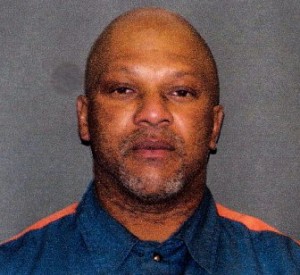
John Alexander, parolable lifer.
Still a prisoner is not truly eligible for parole until each and every one of the statutory conditions has been met. See MCL 791.234(6). These include the parole board interview, public hearing, and hurdles set by possible objections of the sentencing judge or the judge’s successor. Of the 156 public hearings scheduled for 2007 through December 2011, 39 (25%), were cancelled because of judicial objections. Of these, 14 objections were based solely on the offense or its effect on the victim; only 13 were based, even in part, on current information about the prisoner; 12 gave no reason at all. Five of the objections were in cases where the board’s interest in proceeding was based on medical problems that left the prisoner wholly incapacitated. All but one objection was by a successor judge.
Paul D. Reingold is a clinical professor of law at the University of Michigan Law School and was lead counsel in the Foster-Bey case, challenging the post-1992 drop in lifer paroles as a violation of the ex post facto clause. He noted, parole-eligible lifers tend to share a number of characteristics. They are much older than the average prisoner. Although nearly 100 were younger than 18 when they committed their offenses, and more than 200 were under 21, their median age is now around 55.

Waymon Kincaid, parolable lifer.
There are more than 800 parolable lifers here in Michigan. In regard to the House Bills relating to JLWOP, sponsored by they may be unconstitutional because they would only allow a judge to make a decision between a frst degree sentence of life without parole and parolable life. This should be a decision of a jury and not a judge where a person demanded a jury trial which is the case in almost all these cases I would think, if not all of them. I would think the bills need amending. (VOD: this standing also violates the U.S. Supreme Court ruling in Miller/Hobbs, which held that each juvenile lifer must have a chance at individual consideration during sentencing based on seven factors.)
The Court of Appeals has issued an order of stay in People v Cortez Davis, in regards to his resentencing. I am not informed what his attorneys will do at this point, they may appeal the order to the Michigan Supreme Court (MSC) or wait on the outcome of the Carp case once it goes before the MSC.
PERSONAL REFLECTIONS
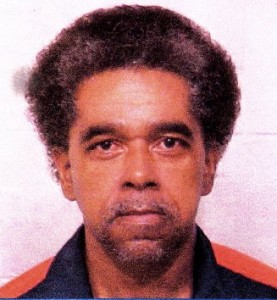
Eric McCullum, parolable lifer.
I have been spending much time considering what it means to be contrite and I wish not to be distracted by the turn of events relating to this case law or bills before the state law makers. I love the subject of law – religious and or non-religious, just as much as morals. My own errors in life have caused me not only to reflect but also to grow as a person. I know that my errors have Affected others in ways that I never foresaw or intended. I’m now very sorry and feeling heart felt about my actions. I know that I did not live up to what was given to me from my family and community. I just did not see it the way I do now. I’m sorry I believe that I did things that my family should have disowned me for, as well as my community, but I’m sure they never did. I’m thankful for that.
I know what the story of Adam is about (Allah knows best). He was young too, and given much and was careless with what he had and his status in creation and he had a great fall. But he did acknowledge his mistake and ask forgiveness of his Lord. My accepting Al-Islam is my asking..I would also like to ask the same of the victim’s family members I remember his mother and sisters were at my trial the whole time, from beginning to end. His oldest sister would look at me as if she was my big sister with this question on her face–why? She did not have a look of being mad but very concerned and sorry for me, it was a look of care. She could have been a member of my own family, she could have been my own sister. I have always been thankful that she did look at me like that because she made me think about what I had been a part of with my actions.
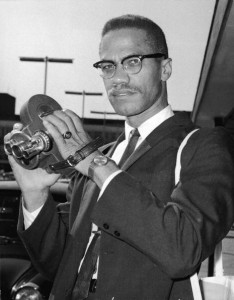
Portrait of American political activist and radical civil rights leader Malcolm X (1925 – 1965) as he holds an 8mm movie camera in London Airport, London, England, July 9, 1964. Shortly after breaking his affiliation with the Nation of Islam, and just days after his formation of the Organization of Afro-American Unity (OAAU), Malcolm X was in London en route to Egypt to attend a meeting of the Organization of African Unity and to meet with the leaders of various African states. (Photo by Express Newspapers/Getty Images)
I am very sorry for my part in the loss of a life and a family member taken from his family, friends and his own life. I wish that I had been more responsible, that I had taken a leadership role when it counted. I could have changed that situation that night. I ask forgiveness of him, his family, friends and my own family and friends and our Lord (Allah).
Do you know who also was killed on Feb. 21th [the date of the killing for which the author was sentenced]? El-Hajj Malik Shabazz. Then to be told that I look like him and to be called by his former name by other inmates since I was about 18, I have been unable to forget Feb. 21, 1975 and my own behavior that evening. It helps me to be more progressive because of my mistakes that evening, I like to believe that I learned something from my failures in life.
I also remind myself, that 17 is not like one’s older years. Decisions are not made the same way (Allah Willing). I now look back and I don’t see my youth as who I am today. That is not to say that there were no good decisions that I made in my youth and that I don’t own up to them. There were and I do. It’s the bad ones that I dis-own and yet I accept them as learning. I would like to get beyond my errors in my youth. They say you do adult crime, you do adult time. The young in fact do more time. In 20 years, you are still young and no one is saying time’s up. However, the adult that says to him or her 20 years is a long time it’s up, you may go old man, but the youth who came in to the prison system at 14-19 he or she may do 40-50 years and their time may not still be up.
There is a former youth here at Kinross Correctional Facility that is about 70 years old who committed his crime at about 16 or 17. No one is telling him time is up. The parole board may see him again in 5 years if he is alive and still not let him go. I pray Allah that is not the case.
I am now 55 as of Jan 8, 2013. I came in at 17. The board just looks at my file every five years. No person-to-person contact. It’s like I am not human. It’s like there is only the file that speaks for me. This is a prison that makes note of your every error, all mistakes are recorded. What you may do of merit is not. You are told you can keep that for your file. It means nothing. This is what your tax money is used for. I once had a parole hearing where the board member spoke to me about actions that I had never been accused of and I pointed this out he said, I have your file here, I am reading it. After my continued protest he accepted that he was wrong and ended my five year review.hearing. I once had a member of the public (Richard Berry) come and he was told that it was not clear if he could be at the hearing so he was not allowed to sit in.
VOD: Below is a video of a conversation with the oldest juvenile lifer in Michigan, to whom Sanders refers, Sheldry Topp, published with an MLive.com article by Jonathan Ostling at the address below. MLive.com ran an excellent series on juvenile lifers in Michigan.
http://www.mlive.com/news/index.ssf/2011/11/aging_michigan_inmates_sentenc.html





